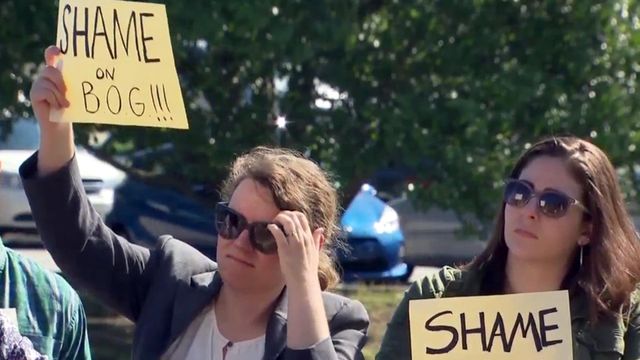Board of Governors muzzles UNC Center for Civil Rights
The Center for Civil Rights at UNC-Chapel Hill will no longer be allowed to take part in litigation or provide legal assistance to clients under a policy approved Friday by the UNC Board of Governors.
Posted — UpdatedThe move, which passed 24-3, with one board member abstaining, comes a day after the board approved a series of proposals aimed at overhauling the administrative structure of the UNC system.
The Center for Civil Rights, which was founded in 2001 as part of the UNC School of Law, has supported poor and disenfranchised people in court free of charge, litigating cases involving discrimination in education, employment and housing, among other things. It receives no state money and is completely supported through private donations.
Board members who supported the change say the center should focus less on filing lawsuits and more on teaching. Opponents say the center provides law students with practical experience and called the move a political attack on civil rights.
Mark Dorosin, managing attorney at the center, chided board members immediately after the vote. "I implore you to be honest with the people of this state. You owe them that," he said.
When someone on the board said Dorosin was out of order, he shouted back, "You're out of order! To say that you support civil rights is out of order!"
Some board members who voted for the new policy said during the brief debate that they continue to support the UNC law school and the Center for Civil Rights.
"I don't really believe that a UNC entity ought to be filing litigation against other parts of our government – our cities, towns and state," board Chairman Lou Bissette said. "If they do this kind of work under a sanctioned clinic, I have absolutely no problem with it."
Bissette and others said a legal clinic would provide a stronger focus on education. The North Carolina Central University School of Law operates a pro bono legal clinic, for example, offering students class credit for working with clients.
"I think, if we’re sitting here a year from now, we’re very likely to see the same kind of work occur under the banner of a law clinic," UNC President Margaret Spellings said.
Center for Civil Rights officials disputed that notion.
"This is about their opposition to the substantive work of the Center for Civil Rights," center director Theodore Shaw said. "This is not about form. This is about substance. The people who are attacking the center and just did their dirty work would not sit back quietly if the Center for Civil Rights were a clinical program. ... They are after us no matter what they said in there because of the substantive work that we do."
"When one of the clinical programs at UNC or North Carolina Central upsets some friend of the Board of Governors, those clinics will be on the chopping block just like the center was," Dorosin said. "Let’s not sit in a room and say we’re voting to shut down the Center for Civil Rights, but we support civil rights. That’s just ridiculous."
Scott Holmes, who heads the N.C. Central legal clinic, said he worries that the Board of Governors could target it as well.
UNC-Chapel Hill Chancellor Carol Folt said she was disappointed by the Board of Governors' decision, saying she thought a "compelling case" was made for the role the Center for Civil Rights plays in the state.
"We now must determine a path forward for the Center and reconfirm our commitment to educating the next generation of civil rights lawyers and providing assistance to the poor and disadvantaged in North Carolina. I will work with other University leaders, stakeholders and the School of Law to explore all options and develop a course of action that allows us to continue this vitally important work while adhering to the new policy," Folt said in a statement. "The School of Law is one of not only the University’s strongest assets, but it is one of our state’s, training generations of students who continue on in service to the state, the nation and the world. That tradition of excellence and service is the core of the school’s identity and it defines our greater purpose."
Dorosin said the policy allows the center to continue working on current cases – it hasn't taken on any news cases since the move was first proposed in March – but he said the center would likely be forced to shut down "within the next few months."
"This work can’t continue at UNC, but we are committed to having it continue somewhere else," he said. "What we want to do is figure out a way to pick up the center, as it works right now, and take it some place else so the work can continue. All options are open."
Board eyes overhaul of UNC administration
On Thursday, the Board of Governors voted for proposals to review "the role, purpose, size and scope of general administration as it relates to the UNC system," including possibly cutting jobs in the office of Spellings and other leaders of the 17-campus system and to shift the system offices from Chapel Hill to Raleigh or Research Triangle Park.
"The potential relocation should more closely reflect General Administration and the Board of Governors duty to represent the entire university system and remove the appearance of being more closely aligned with any single campus," the latter proposal reads.
Committees have 45 days to submit reports on both proposals to the full board.
The board also approved a resolution Thursday to rein in tuition and fees at UNC schools, noting that tuition has increased by 91 percent, on average, across the system since 2006, compared with a 17 percent increase in North Carolna's median household income during that period.
• Credits
Copyright 2024 by Capitol Broadcasting Company. All rights reserved. This material may not be published, broadcast, rewritten or redistributed.






